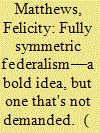| Srl | Item |
| 1 |
ID:
162587


|
|
|
|
|
| Summary/Abstract |
THE GREATEST threat to sustaining our democracy is not the obvious one of populism. It is the elitism which has given our democracy the characteristics of complacency, entitlement, resistance to reform and lack of sensible access and engagement for the electorate. We have a democracy not fit for purpose and one unable even to defend itself effectively against its more obvious enemies. Most of those who should be defending our democracy by extending it have—with a few honourable exceptions—been enjoying a free ride. Politicians, academics and journalists have all taken democracy as a given to be preserved rather than something organic that will either grow or wither. It requires daily polishing, burnishing and reinvention if it is to evolve rather than have history swallow it.
|
|
|
|
|
|
|
|
|
|
|
|
|
|
|
|
| 2 |
ID:
162585


|
|
|
|
|
| Summary/Abstract |
Britain, Bruce Ackerman argues, has ‘muddled its way into a curious arrangement’ of asymmetric devolution, which has dis‐united the Kingdom, disempowered a significant proportion of the populace, and disregarded the risks of what he describes as ‘mono‐cultural rivalry’. However, whilst Ackerman's diagnosis is correct, his prescription of ‘fully symmetric’ federalism is unlikely to remedy this democratic malaise. As this response shows, there is limited political consensus as to where regional boundaries should fall and there is little public appetite for an additional layer of regional governance. Therefore, rather than bolting another layer of governance onto a flawed substructure, we should instead focus on its repair by reforming Westminster's electoral system and revitalising local government. These two proposals may be more modest than Ackerman's bold vision, but if implemented they would provide solid foundations for the development of a more deliberative and consensual way of doing politics that UK so sorely lacks.
|
|
|
|
|
|
|
|
|
|
|
|
|
|
|
|
| 3 |
ID:
162584


|
|
|
|
|
| Summary/Abstract |
Bruce Ackerman argues that the United Kingdom is in such a profound political crisis that it needs a constitutional convention to determine the framework for its political future, especially with respect to its nations. He suggests that the proposals emerging from such a convention assembly be put to a referendum after a country‐wide process of deliberation.
|
|
|
|
|
|
|
|
|
|
|
|
|
|
|
|
| 4 |
ID:
162586


|
|
|
|
|
| Summary/Abstract |
In this reply Michael Kenny identifies the distinctiveness of Ackerman's characterisation of Britishness and the case he makes for constitutional reform. But he queries the remedies that he advances and, in particular, the attempt to address the problem of asymmetry through a system of regional government in England. Kenny argues instead that any adequate approach to reform in this area needs to grasp the decline of existing forms of territorial statecraft in the UK and the specific character of, and underlying motivations for, the increasing sense of democratic self‐assertion among the English.
|
|
|
|
|
|
|
|
|
|
|
|
|
|
|
|